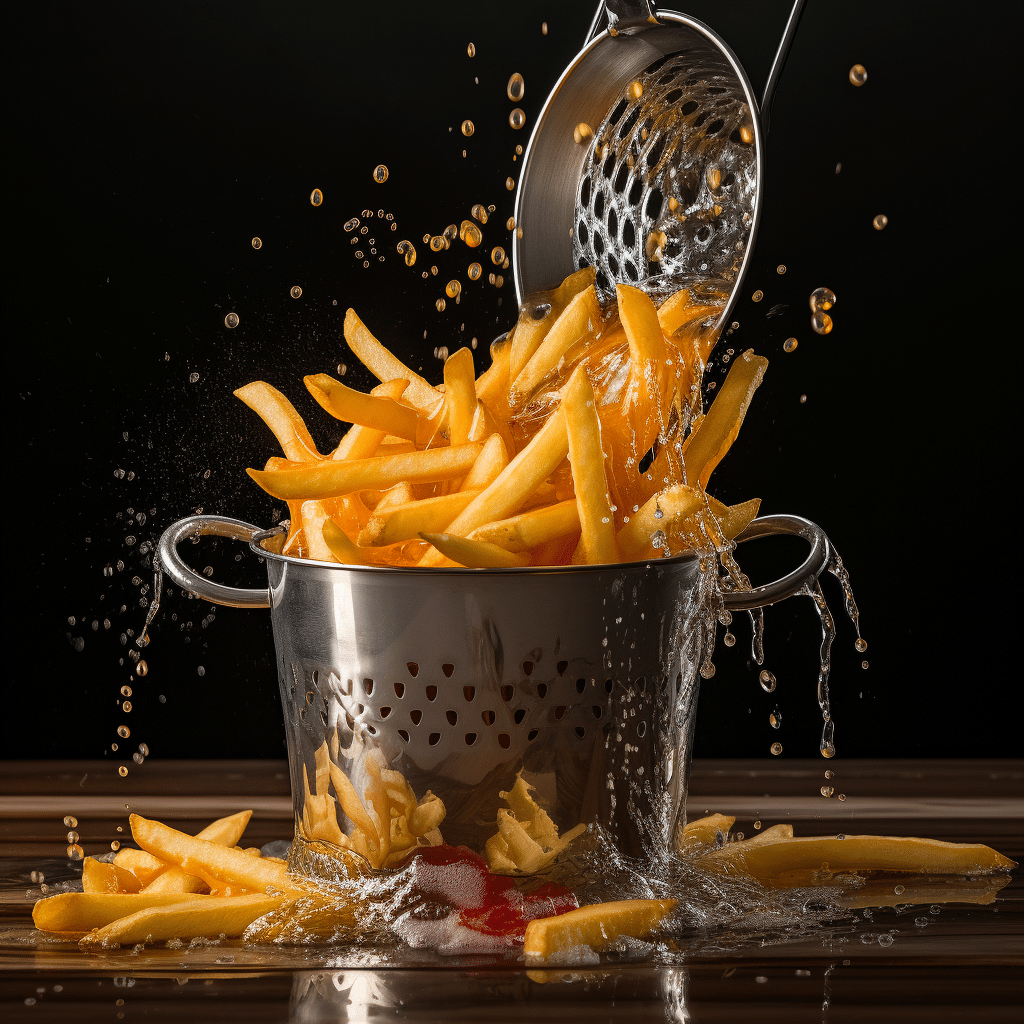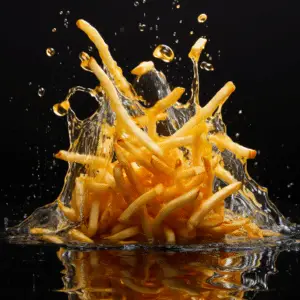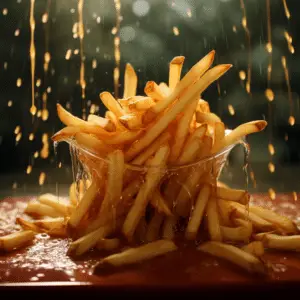
Preventing Soggy Fries: Tips for Perfect Crispiness
Nothing Preventing Soggy Fries beats well-prepared fries. The outside crunch, softness that lies within, and the savory taste make this fast food hit different. However, there are times when fries are mushy and miss the crispiness. Whether store-bought or prepared at home, you can prevent your fries from becoming mushy. This article discusses different ways of keeping fries from getting soggy.

Ways Of Preventing Fries From Becoming Soggy
Choose The Best Potatoes
Not all potatoes are the same. You’d want potatoes with low moisture content for fries, and Idaho potatoes are the best. Idaho, also known as Russet potatoes, have a high carbohydrate and the least moisture content.
Steer clear of waxy potatoes. These include new potatoes, potatoes with red skin, and fingerling potatoes. Waxy potatoes contain a lot of water, which evaporates during cooking, making them hollow out.
Cut Potatoes Into The Right Size
Cutting potatoes too thick will likely lead to soft fries that can become soggy easily. And cutting them too thin will make them highly crunchy, with no flesh inside. The best way to cut potatoes is to slice them into ¼-inch slabs. Then slice the slabs into 1/4-inch strips. This will make your fries measure around 3 inches long.
Soak Fries In Water Before Cooking
Once you’ve cut your fries into a nice and uniform shape, soak them in plain water. Doing so ensures the potatoes leach as much of their starch as possible. Have you realized when you soak potatoes in water, the water changes its color to whitish? That’s starch being washed away from the potatoes. Lots of starch can make fries get soggy when cooking.
Some people prefer adding vinegar to the soaking water. Vinegar, whether white, apple cider or red, increases the concentration of water. This increased concentration ensures as much water is removed from the potatoes as possible. There’s also the bonus of enhanced flavor from the vinegar. And the result is flaccid fries with minimal water content.
Use Saltwater Bath
Like soaking potatoes in plain water, you can soak them in very salty water. This concept is called saltwater bath. When you soak potatoes in a salt-concentrated solution, they lose their water to the salt solution—this results in the potatoes having less water, preventing sogginess.
Rinse Well
Once your potatoes have soaked in water or saltwater bath, rinse them as much as possible. Then pat them until completely dry before frying. Rinsing well ensures you’re washing away as much starch as possible, which may otherwise lead to soggy fries. So, next time you’re making fries, never get tired of rinsing them many times until the water turns clear.
Coat In Flour
Coating fries in flour help make them more crispy, preventing sogginess. To do this, place your dried potatoes in corn starch or rice flour, and give it a good mix, ensuring all the fries are coated with flour. You can also season the flour with salt and any preferred spices like paprika, turmeric, onion, or garlic powder. Once every piece is nice and coated, fry the potatoes in hot oil and serve.
Boil Before Frying
Some people swear by this method. They say boiling potatoes before frying gives them a crispy outside texture. To do so, start by adding your potatoes to boiling water and let them simmer for 3-5 minutes, or until they are half-cooked. Then, fry them the way you usually do.
The other option is to boil the potatoes until they are well cooked and a fork can pass through easily. Continue with frying them as usual. This second option is preferred, as it gives the fries a good crunch and prevents sogginess.
Use Good Oil
Vegetable oils are excellent for making fries, with peanut oil being the best. Other oils like safflower and canola are also suitable for cooking fries. When deep-frying, oil heats up and then breaks down. Oil with a high smoke point breaks down faster than oil with a low smoke point. This creates crispy fries, preventing sogginess.
Reusing oil continuously also makes fries crispy. That’s why restaurant fries are so crisp. As a step guide, reuse the frying fat 3-4 times, or a maximum of 6 hours of cooking time. Remember to store the oil well in an airtight container in a cool, dark place like a fridge.
Heat Oil To The Right Temperature
Your oil temperatures affect the outcome of your fries. If the oil is too hot, it will burn and burn your fries, browning them. On the other hand, if it’s a shade too cool, the fries will absorb so much oil and become soggy. So, ensure your oil is hot enough for frying to prevent soggy fries.
Fry Twice
The double-fry method is incredible at making fries crispy. In this method, you’re frying the potatoes twice. The first time involves low temperatures to cook the potatoes inside. And the second time entails higher temperatures to brown the fries and make them crunchier.
A Dutch oven or a deep-frier both work great. You may want to use a frying or candy thermometer to track the oil’s temperatures. This way, you’ll be sure you’re on the right track. Use thermometers that clip on the pot’s edge to prevent it from sliding around.

Lay In Wide Tray
Another way of avoiding soggy fries is to lay them on a wide tray for cooling. Once prepared, place the fries on a wide tray or oven rack, so they don’t clump against each other. Clumping can make the hot fries release steam which steams other fries in contact, making them soggy.
Don’t Cover
Covering hot fries will result in steam buildup in the container. This steam will soak the fries, making them soggy.
Lay Fries Flat
If you plan to pack your homemade fries, ensure you stack them horizontally at the bag’s bottom. This is the trick to preventing soggy fries. Lying fries horizontally means they’ll have enough ventilation.
Conclusion
There’s Preventing Soggy Fries nothing as boring as your fries getting soggy. But the good thing is that there are a couple of ways (discussed in this article) to prevent that. We hope you found it helpful and maybe incorporate them in future.